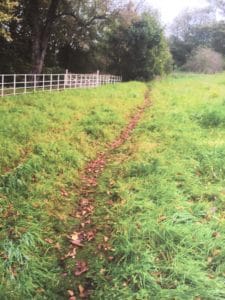Support us from £3/month
We deal with almost 1000 cases a year assisting communities, groups and individuals in protecting their local spaces and paths in all parts of England and Wales. Can you help us by joining as a member?
York City Council has agreed to step up its work on public paths. The decision was made by the council’s executive on 18 July, in response to a complaint by our member, Mr Graham Cheyne, to the local government ombudsman (LGO).
On 9 May the LGO told the City of York Council that it must speed up its work on updating the official (definitive) map of public paths after Graham complained of the council’s inaction on his application to add a path at Fulford to the definitive map. 
The council had said that it would be 29 years before it could proceed with his application. If paths are not recorded on the map, they are given no protection and are unlikely to be maintained.
The LGO said that York must within three months (ie by 9 August) start and finish a review of its service for recording paths on the definitive map with the aim of reducing the backlog, and within a further month report the findings to councillors and seek their approval for any changes required. Within a further two weeks it must inform Graham when it expects to be able to make the order on his application. It must also write to all the other applicants for orders, updating them on changes in the service and giving a time frame for determining their applications.
On 18 July the council approved the changes to its service. It has adopted a revised statement of priorities for applications to add paths to the definitive map to speed up the response time; these matters will in future be dealt with by a more senior officer; it will report to the council every six months on the progress in reducing the backlog of applications, and it will develop an apprentice or trainee role for rights of way, initially to focus on definitive map modification order applications.
Says Graham: I am very pleased that City of York Council has reviewed and revised its procedures for processing applications to add paths to the definitive map. I hope this will now ensure that it clears the backlog quickly. In my case, with the new policy, the time should be reduced from an expected wait of 29 years to under three months. Thank you to the Open Spaces Society for highlighting what is a national problem with such applications.’
Adds Kate Ashbrook, our general secretary: ‘Thanks to Graham’s persistence, York Council has changed its practices and we hope that it will now give proper priority to public paths, which are so important for all. There are other councils which should follow York’s example.’
The papers for the meeting are here.
